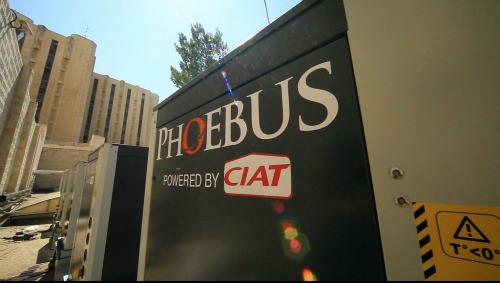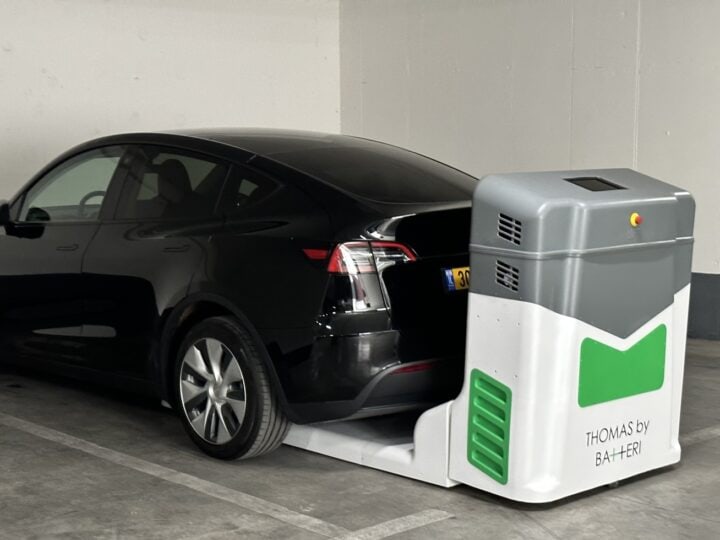An Israeli hybrid water-heating system shaves thousands of dollars a year off heating costs at big facilities, and vastly improves efficiency.

Heat pumps, more common in moderate climates than extreme ones, have been around for about 60 years. They create a greener heating system and work by using a small amount of electricity to pull heat from one place to another.
Improving on the old design, the Israeli company Phoebus Energy is giving “brains” to the water heating industry. The Phoebus solution can save hundreds of thousands of dollars a year on heating costs for big facilities, and improve efficiency by up to 70 percent, they say.
Hotels, hospitals, sports centers and even prisons are in constant need of hot water. The water must be very hot to meet health guidelines, and showers can never run cold at a luxury hotel. Ever.
“It’s like open-heart surgery — you can’t allow [even] one hour [off] at five-star hotels or hospitals,” says Yaron Ben-Nun, who heads marketing at Phoebus’ energy team. The industry is conservative, so Phoebus engineers had to prove their Hydra hybrid water heating system could handle upgrading a system without interruption.
After collecting accurate data on inputs and outputs of the water and heating systems in each facility, Hydra calculates the costs of producing hot water from variable heat sources and sends the optimal instructions to the system. This results in an endless flow of hot water, and cost savings filter through to the monthly bill.
Making energy transparent
Hotel owners “have no idea of what’s going on in their system,” Ben-Nun tells ISRAEL21c. “Money savings is just one aspect. We believe in energy efficiency. Because energy was so cheap for so many years, many systems were built without thinking of efficiency — so there is much to do before we recreate new energy sources.
“As a company, we believe that saving one kilowatt is much wiser than producing a new kilowatt.”
Phoebus is working hotel by hotel to transform the way energy is delivered to heat water. Managed by smart “cloud” software, Hydra integrates existing gas, diesel, oil or liquid petroleum heating systems with a heat pump farm, which transfers solar energy efficiently from the air to end users.
Each installation is individually calibrated to shave digits off the utility bill after Phoebus analyzes energy usage parameters such as oil and electricity prices, humidity and power demands.

“To have the right algorithm or to have the right [gas savings calculator] for your hybrid car is almost the same as what we are doing,” Ben-Nun says.
To date, the client’s return on investment has been less than three years, he reports. The company has 36 installations in Israel, including one going in at the biggest hotel in the country, the Jerusalem Ramada. A team of seven, beyond the Phoebus staff of 14 in Israel, is working on two installations in Greece — at a Holiday Inn and a Crown Plaza — and the company is looking to break into markets in Mexico, Cyprus, Spain, Panama and Bulgaria.
Funded with about $4.5 million by Terra Venture Partners, the Galilaea Group and Chesapeake Advisory Group, Phoebus isn’t seeking more funding, says Ben-Nun, but financers might be brought in to cover aggressive marketing campaigns in new markets.
Less greenhouse gas
Heat pumps are not a new invention, but the company’s IP secret is in the sensors installed to measure, every 15 minutes, the factors that amplify efficiency in the system. If results show that running on electricity isn’t optimal, the system can switch over to traditional fuel, like natural gas or diesel.
Consider the Holiday Inn in Greece near Athens. It used to guzzle 240,000 liters of diesel fuel each year for heating steam for laundry and producing hot water. Now using the Hydra System, the hotel is saving 170,000 euros per year. And greenhouse gas emissions have decreased by more than half.
The intelligent Hydra system absorbs energy from the air, turning it from thermal energy to kinetic energy. Unlike solutions that rely on solar energy, thermal energy can be pulled from the air 24 hours a day, especially in intense summer months. The caveat is that the outside temperature needs to be at least five degrees centigrade for it to work.
Founded in 2007, Phoebus (the name of the Roman sun god) is based in Ra’anana, Israel. By the end of the year, it will launch a new product, the Hydra Balance, which will integrate with air-conditioning units.
While the project is still hush-hush, Ben-Nun reveals: “The Hydra Balance does new things with savings that are much higher. We believe that there is a lot of work to be done in saving energy for these facilities and we concentrate all the time to understand the technologies to develop our own.”















